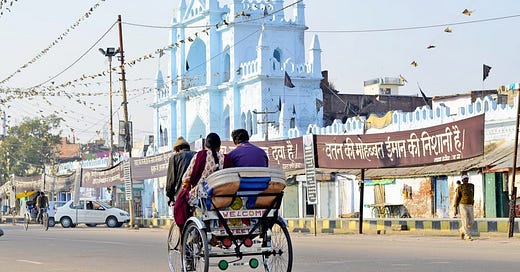Emerging Markets Daily - July 19
India's Uttar Pradesh Two Child Policy, OPEC To Boost Supply, Lula's Brazil Comeback Tour, China Carbon Trading, African Central Banks Hold Rates Steady
The Top 5 Emerging Markets Stories from Global Media - July 19
India's Most Populous State Seeks to Promote Two-Child Policy
Reuters
“India's most populous state, Uttar Pradesh, has proposed legislation that aims to discourage couples from having more than two children, becoming the second state ruled by Prime Minister Narendra Modi's party to make such a proposal.”
“If Uttar Pradesh were a country, its 240 million people would make it the world's fifth most populous, and population density in the northern state is more than double the national average.”
“Under the state government proposals unveiled on Saturday, couples with more than two children would not be allowed to receive government benefits or subsidies and would be barred from applying for state government jobs.” Reuters reports
Opec+ Ends Deadlock and will Boost Supply in August
The National
“Opec+, the group of oil-exporting countries behind recent historic production cuts, will bring 400,000 barrels per day back to the markets in August and will revise baselines used to calculate quotas from May 2022, following requests by countries including the UAE.”
“Under the latest agreement, the UAE's new production baseline will increase to 3.5 million barrels per day, from 3.168 million bpd previously. Other producers including Iraq, Kuwait, Saudi Arabia, and Russia will also see their baselines rise.”
“The UAE ‘is committed to this group and will always work within this group to do our best to achieve the market balance and help everyone’, Minister of Energy and Infrastructure, Suhail Al Mazrouei, said at a ministerial meeting held online on Sunday. ‘The UAE will remain a committed member in the Opec alliance.’” Jennifer Gnana reports
Lula’s Comeback Tour Shakes Brazil Politics
Financial Times
“Since his return to Brazilian politics in March with a rollicking speech at a metalworkers’ union outside São Paulo, the popularity of Luiz Inácio Lula da Silva has continued to rise.”
“Opinion polls suggest Lula — who served two terms as president between 2003 and 2010 — would easily defeat the firebrand conservative Jair Bolsonaro if elections scheduled for October next year were held today. But while the leftwing former leader’s call for a return to normality after three divisive years of Bolsonaro’s populist rule has resonated, some Brazilians wonder what a new Lula presidency could look like.”
“Over half a century in Brazilian politics, the 75-year-old has shown different stripes. Lula has conceded that his ideas ‘change when the facts change’, and he has veered from socialist union leader to the head of a liberal economic administration in 2003.”
“Today he pledges support for the free market while vowing to intervene in state-run companies if it means improving the wellbeing of Brazilians. Some also wonder whether Lula would seek political vengeance once back in power.”
“He spent almost two years in prison following a corruption conviction in Brazil’s sprawling Lava Jato, or Car Wash, investigation. He deems the conviction, which was quashed by the Supreme Court in March, the result of a political plot by his opponents. The former president’s allies insist any third term would be characterised by pragmatic dealmaking, progressive values and the protection of democracy.” Bryan Harris reports.
China Fires up Carbon Trading as Asia Turns onto Greener Path
Nikkei Asia
“Asia's nascent market for buying and selling carbon emissions has been boosted after China, the world's biggest polluter, launched a long-awaited national trading system.”
“Trading began in Shanghai on Friday with an opening price of 48 yuan ($7.40) per ton of carbon, and the first deal traded at 52.78 yuan per ton. Some 160,000 tons worth 7.9 million yuan were traded. Local media Yicai reported that in five years' time the market could reach 7 billion tons annually, with a market value of 600 billion yuan.”
“…China is not the only Asian country developing trading systems. Indonesia is running a trial carbon trading system until August for the power sector. Provisions for a domestic carbon market were included in Vietnam's environmental protection law last year. Carbon markets are also under consideration in Thailand and the Philippines.” Akane Okutsu, Kim Jaewon, and CK Tan report
African Central Banks to Hold Key Rates Amid Virus Resurgence
Bloomberg
“Central bankers in six sub-Saharan African countries are likely to leave borrowing costs unchanged over coming weeks as a resurgence of coronavirus infections driven by the highly transmissible delta variant threatens to choke off lackluster economic recoveries.”
“Since monetary policy committees in some of the region’s key nations last met, temporary restrictions on movement were imposed in western Kenya in a bid to avoid a catastrophic fourth wave of infections. In South Africa, the reintroduction of strict lockdown measures and deadly riots have emerged as key risks to economic growth.”
“Higher oil prices may bolster economic growth in Nigeria, the continent’s top crude producer. But the increased cost of imported refined fuel will also stoke consumer-price growth, adding to pressures of rising food costs.” Prinesha Naidoo reports
What We’re Also Reading…
China had Never Said No to a Tech Merger until This One
South China Morning Post
“The Chinese government had never said no to a merger deal in the country’s technology sector until last Saturday when the State Administration for Market Regulation (SAMR) blocked Tencent Holdings’ plan to merge Douyu and Huya, two video game live-streaming websites it controls.”
“Analysts says Beijing’s veto is a clear sign that the Chinese authorities are no longer shy to act on antitrust issues, putting an end to a freewheeling era in which Big Tech companies were able to engage in aggressive merger and acquisition activity to achieve market dominance.”
“Moreover the decision to reject the merger, which would have created a video game streaming behemoth worth more than US$10 billion allowing Tencent to take on Amazon’s Twitch, sets a precedent with far-reaching implications for the country’s internet industry.” Josh Ye reports



